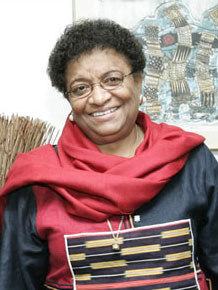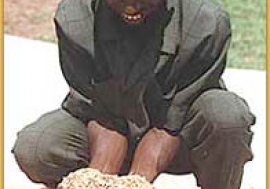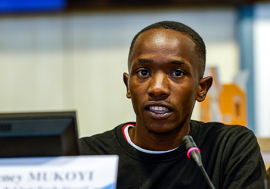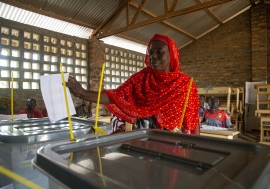Liberian woman breaks the ‘glass ceiling’
Liberian woman breaks the ‘glass ceiling’
 President Ellen Johnson-Sirleaf.
President Ellen Johnson-Sirleaf.The election of Ms. Ellen Johnson-Sirleaf as the new president of Liberia stands as a double landmark. The event signalled an important step in the West African nation’s transition to peace after 14 years of civil war; it also marked the first time that a woman was elected to the highest political office anywhere in Africa.
The only woman among 22 presidential candidates in the first round of the elections in October, Ms. Johnson-Sirleaf ultimately beat out all her competitors. Those included the popular former soccer star George Weah, whom she surpassed by a comfortable margin in the second round on 8 November, with 59 per cent of the vote to Mr. Weah’s 41 per cent.
“We have shattered the glass ceiling,” Ms. Johnson-Sirleaf told her jubilant supporters, referring to the barrier of gender discrimination that has often kept women from attaining high office. “And I hope women will seize the moment to become active in civil and political affairs.”
Femmes Africa Solidarité, a non-governmental network that works mainly in war-torn African countries, hailed the election as “a major leap forward in the struggle for equal participation in decision-making.” Ms. Kofo Laja-Olugbesan, a leader of the Nigerian women’s association Target 2007, declared that “this is one moment in history we had all longed and hoped for.”
Campaigning on her merits
Although Ms. Johnson-Sirleaf made specific appeals to Liberian women voters, her campaign addressed a broad range of issues. These included fighting corruption, ensuring security, achieving national unity and reconciliation, and spurring post-war economic recovery.
In appealing for votes, Ms. Johnson-Sirleaf highlighted her skills and extensive experience. In the 1970s she served as deputy finance minister. After Sergeant Samuel Doe staged a coup in 1980, she left the country for several years to work as a loan officer for the World Bank and as a CitiBank director in Nairobi.
When she returned home in 1985, President Doe promptly placed her under house arrest for her criticisms of his repressive rule. Compelled once again to go into exile, she took high-level jobs in a number of banking and investment institutions. In 1992 she was appointed director of the UN Development Programme’s Regional Bureau for Africa, a position she held for five years.
Meanwhile in Liberia, President Doe was killed and the country descended into a multisided civil war. In 1997, when a tentative peace accord called for elections, Ms. Johnson-Sirleaf returned to campaign for the presidency. Although she lost, she was the main challenger to Charles Taylor, the strongest of the warlords.
President Taylor’s dictatorial methods eventually led to renewed civil war. Ms. Johnson-Sirleaf participated in various initiatives to end that war, while also putting her experience in conflict resolution to use elsewhere. She was one of seven eminent persons appointed by the Organization of African Unity in 1999 to investigate the Rwanda genocide, she helped chair a dialogue among political currents in the Democratic Republic of the Congo in 2002 and that same year she helped author a report by the UN Development Fund for Women (UNIFEM) on women’s roles in building peace.
In 2003, under tremendous domestic and international pressure, President Taylor left Liberia, easing the way to a comprehensive peace agreement. A UN peacekeeping mission oversaw demobilization of the armed factions and supported Liberians’ efforts to organize free and fair elections. In congratulating Ms. Johnson-Sirleaf on her victory, UN Secretary-General Kofi Annan vowed that the UN would continue to support Liberia’s efforts to achieve lasting peace and development.
A daunting agenda
The tasks facing her new government, which takes office in mid-January, will be “awesome,” Ms. Johnson-Sirleaf told UNMIL Focus, a magazine of the UN peacekeeping mission. “There’s hardly anything you can think of that’s not a priority in the country.”
Liberia must be rebuilt. “We will work to create jobs,” Ms. Johnson-Sirleaf has pledged. “We will help our farmers return to the land and grow food for self-sufficiency. We will work to improve social conditions, including the restoration of electricity and water services.”
Above all, she has said, there must be national reconciliation and the consolidation of peace. Achieving those goals will involve ensuring security for ordinary Liberians. They also will entail easing the political tensions that flared during the election, when supporters of Mr. Weah took to the streets to protest his loss.
Ms. Johnson-Sirleaf has vowed to establish a “government of inclusion” that is transparent and honest, reflects all viewpoints and encourages decentralized decision-making. “Never again in this nation,” she has said, “shall a person or group of persons feel so excluded that they have to resort to violence in the name of justice.”
















